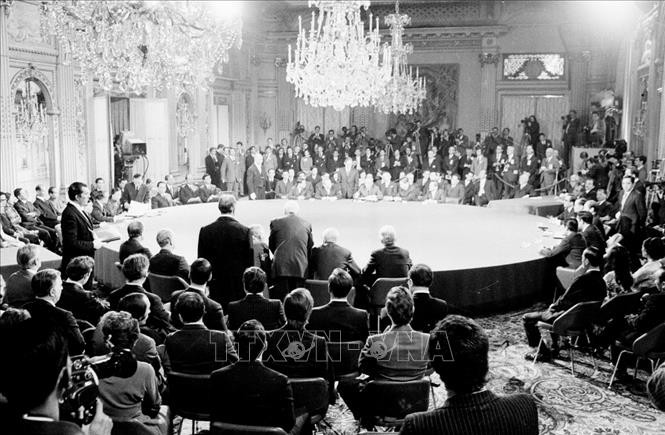(VOVWORLD) - The victory of the Ho Chi Minh Campaign 50 years ago (April 30, 1975) was attributed to the masterful combination of military, political, and diplomatic fronts. Vietnam’s diplomacy succeeded in building a global people's front in solidarity with Vietnam, creating a front of "fighting while negotiating," which ultimately led to the signing of the Paris Peace Accord in 1973 and culminated in the historic Spring Victory in 1975.
 The signing of the Paris Peace Accord on January 27, 973 in Paris. (photo: Van Luong/VNA) The signing of the Paris Peace Accord on January 27, 973 in Paris. (photo: Van Luong/VNA) |
Diplomatic struggle is not merely a reflection of battlefield realities. It is a front of strategic importance. That viewpoint, rooted in Vietnam’s long history of construction and defense, continued to be developed in the Ho Chi Minh era.
Diplomacy – a vital and strategic front
Since the establishment of the National Liberation Front for South Vietnam in December 1960, diplomatic activities by North and South Vietnam were carried out under the motto “two but one, one but two,” making significant contributions to the nation's overall victory. Diplomacy opened up the stage of “fighting while negotiating,” maximizing the impact of victories in the battlefields at the negotiating table.
Effective coordination between the military, political, and diplomatic fronts led to the signing of the Paris Peace Accords in January 1973, helping Vietnam step-by-step progress toward the ultimate triumph in April 1975. Diplomacy established a global people's front in support for Vietnam, including within the US.
Former Vice President Nguyen Thi Binh, who was a key figure at the Paris Accord negotiations, recalled: “American friends self-immolated to protest the war while millions of people around the world defied suppression and imprisonment to join protests and marches calling on the US to end the war. Their solidarity and support were a powerful source of strength for Vietnam to win on the battlefield and at the negotiating table during those fierce and harsh days.”
After the signing of the Paris Agreement in 1973, Vietnamese diplomacy skillfully used diplomatic weapons to raise high the flag of peace, independence, and national harmony, clarify the just cause of Vietnam’s struggle, and garner sympathy and support from revolutionary forces and progressive peoples around the world.
Millions of people, from state leaders and politicians to ordinary citizens in many countries, took to the streets to protest the war and support the righteous struggle of the Vietnamese people.
Professor Nayan Chanda of India, a former correspondent of the Far Eastern Economic Review in Saigon and a Reuters contributor who was in Saigon on April 30, 1975, said that, after years of researching the war in Vietnam, he realized that Vietnam’s remarkable strength during the historic Ho Chi Minh Campaign stemmed from its diplomatic vision.
“Vietnamese diplomacy has worked in a par with military strategy. Vietnamese diplomats worked resiliently and tirelessly to garner international support, especially the youth across the world, including young people in the US. Vietnam made effective use of this idealistic support by highlighting how the war was also inflicting pain on the American people. The public support for Vietnam abroad was equivalent to having multiple army divisions. While Americans were fighting in Vietnam, the US government was also confronting its own citizens on the streets of America,” said Professor Nayan Chanda.
Timeless diplomatic lessons from history
The lessons learned from the Great Spring Victory in 1975 continue to be creatively applied in national development. The combination of national strength and the power of the times, along with close coordination between diplomacy, defense, and security, has been a decisive factor in all of Vietnam’s revolutionary successes.
Guided by the consistent principle of safeguarding national interests, Vietnam considers building friendly and comprehensive cooperation with other countries an indispensable part of its diplomatic mission. Vietnam has always treasured the immense material and spiritual support of international friends during its post-war reconstruction and national development.
Ambassador Nguyen Phuong Nga, former President of the Vietnam Union of Friendship Organizations, said: “Fifty years have passed, but our friends have preserved their enthusiasm and unwavering love for Vietnam and Vietnamese people. They are always ready to help Vietnam rally international solidarity for national construction and defense. They are truly timeless friends.”
After 50 years, Vietnam is now entering a new era with renewed aspirations, setting out fresh missions for its diplomacy. The valuable diplomatic lessons learned from the historic Spring Victory of 1975 have been continued and developed. They underpin the school of peace and friendship diplomacy that Vietnam is pursuing in this new era.